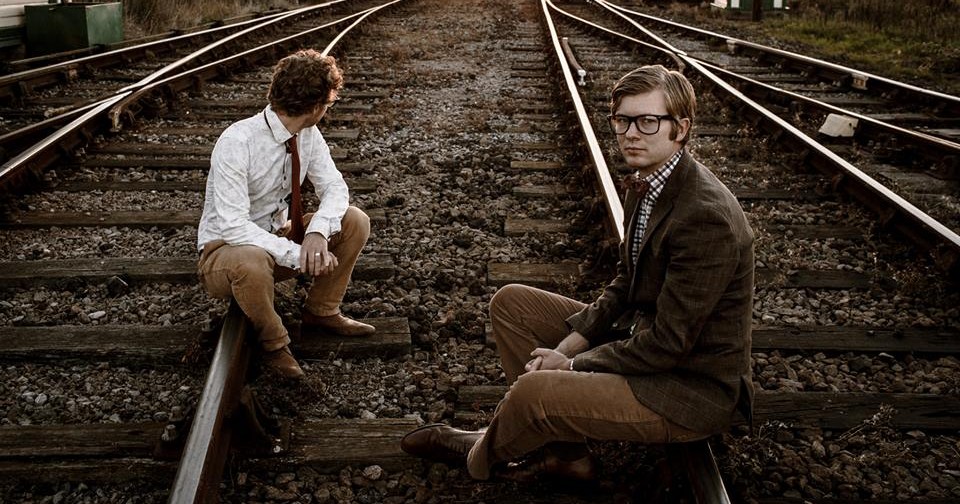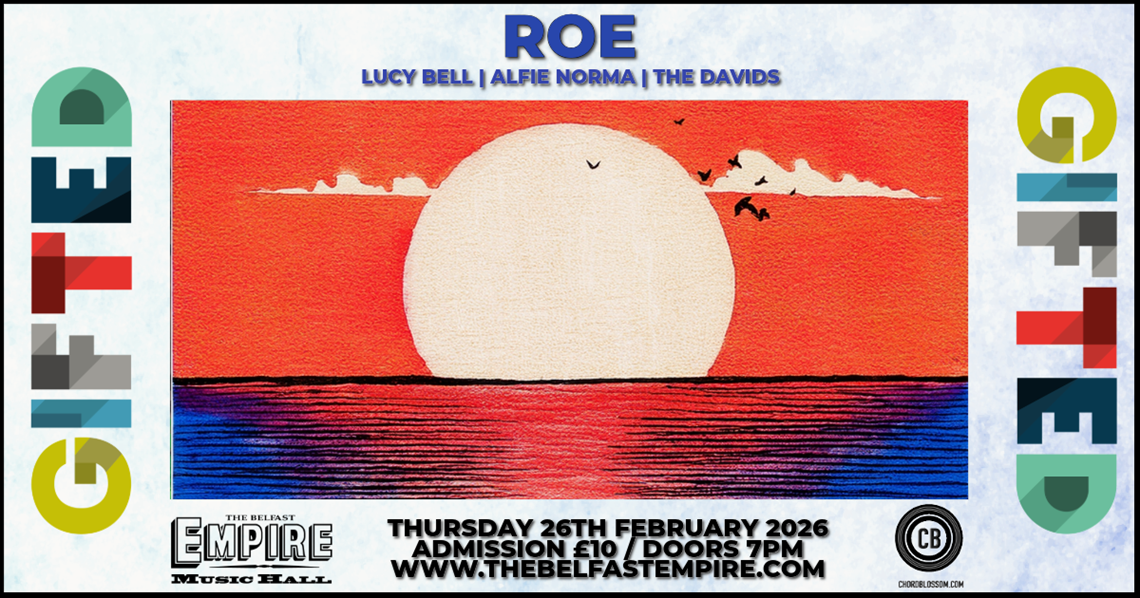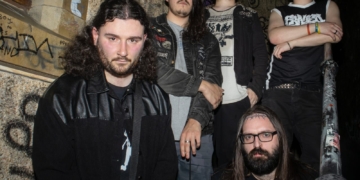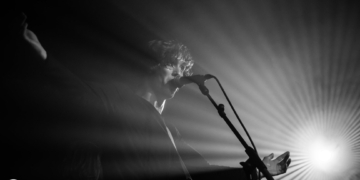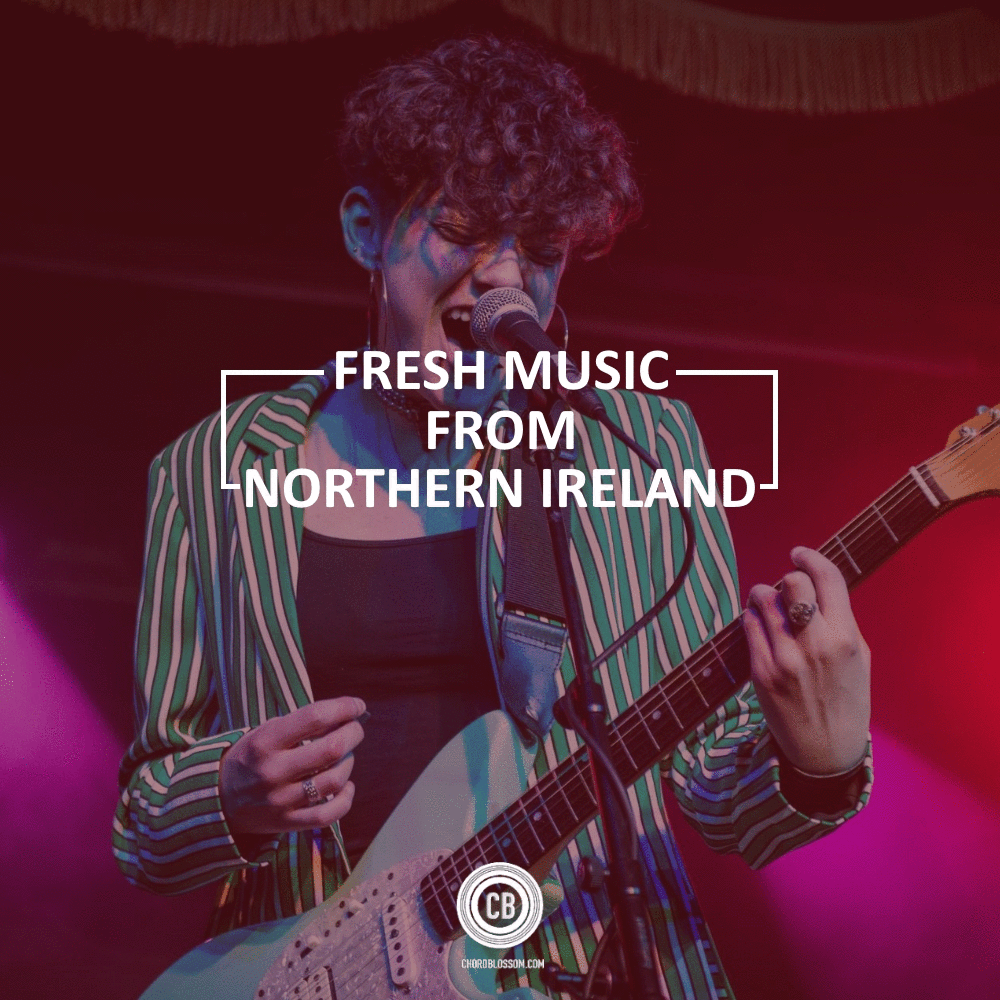“Teaching the lessons of the past through the music of the future.”
Now that’s a bold mission statement. J. Willgoose, Esq. and Wrigglesworth are the characters behind quirky London duo Public Service Broadcasting. Mixing samples of old public information films and archive material with live music is their shtick – an intriguing and unique one at that. Their radar is set to cover Belfast and Derry next month, so Chris McBride was our man on the case to grab the inside scoop.
► How did the idea for Public Service Broadcasting first come about?
J. Willgoose: I suppose it was listening to Archive Hour on Radio 4 and hearing about the release of BFI films online for the first time. It sounded quite interesting, so I had a look at those. I’d previously used samples from different sources to make music, like computer games, and speech from films. But these samples had a lot of character to them and I really liked the sound of them. It happened quite gradually – it wasn’t a one-off type “lightning-bolt” idea.
► How does a PSB track come together? Do you start with the sample, or do you create a music motif before finding a suitable sample?
Our sound is a slightly odd blend. It’s fundamentally electronic music, but with an emphasis on live playing as well, it’s a hard one to describe I suppose. It’s got elements of all different genres, there’s a krautrock influence on a couple of songs, more electronic elements on others, there’s also a couple that are quite heavy, so I think it’s a wide ranging sound.
Normally there’s a small music idea somewhere. It’ll be something very small, like an idea for a melody or a little idea for a song, and at the same time I’m always doing research and keeping an eye out for stuff I find interesting or footage that I might want to use one day, and the two tend to marry up in my head ahead of time. Then I start writing music, often with a film in mind. Although sometimes I write a piece of music and have to try and work backwards and find a film that would suit it.
► How long would the gestation period for one of your songs be?
It’s difficult to say, because I’ve never had a full crack at it, as I had been in full-time work until January of this year, and then after leaving that and doing this full-time we’ve been so busy touring that the idea might come to me at one stage and then it’s another month that I can actually sit down and start writing it. I’ve not really been able to go from “there’s a musical idea, let’s get it down” to see how quickly it takes. It does take a long time, it’s a labour intensive process, but I’m sure it can be done quicker than I currently do it.
► I imagine it’s rewarding when you hear the finished product?
I suppose so. By the time you get to the end and the song is “finished”, you’re normally quite sick of it because you’ve heard it so much and you lose a great deal of the subjectivity you originally would have had over it, so you feel close to it but also quite distant from it. It’s kind of a weird feeling.
When I had finished ‘Spitfire’ – I had real trouble finishing that song – I didn’t know whether it was any good anymore. Sometimes I’d listen to it and think “that’s alright”, and other times I’d think “that’s a bit boring, I don’t know what I was thinking.” I’m the worst judge of my own music probably.
❝ I suppose it’s a bit of a cliché to end with some uplifting brass, but I think we pull it off. ❞
► Your music is quite sample based. Have you ran into difficulties trying to get the samples cleared for use?
We’ve had a couple we couldn’t use, which was frustrating, but there’s not much you can do about it. It’s just the nature of the beast, I suppose. A great deal of it is already public domain anyway, so we’re in the clear on that. We’ve got a great relationship with the BFI (British Film Institute), and also with Studio Canal, so those guys are very helpful to us if there’s something they have the rights to that we’d like to use. We’re developing relationships with other companies and other rights holders, so hopefully the higher the profile we have the easier it will be to do that.
► Unlike a lot of artists who would use samples in their work, the music of Public Service Broadcasting sounds a lot more “live”, using live instruments like the guitar, banjo and drums. When you started the project, did you want to have live instrumentation?
Definitely. It stemmed from going to a few electronic gigs and becoming incredibly frustrated by what I was seeing. I liked the music, but you stood there while some bloke on stage effectively checked emails on his laptop. I mean for all you know thats exactly what he had been doing. It’s frustrating when there’s no musical engagement with what you’re hearing and what you’re seeing, so the emphasis was very much on trying to play as much as it live as you can, and in the process it becomes more of an interesting visual spectacle as well as a musical one.
► You released your debut album “Inform – Educate – Entertain” back in May, reaching no.21 in the UK album chart, which is a phenomenal success for an independently released album. Were you surprised by how successful it was and how well people responded to it?
I was very surprised. If you’d have told me two or three years ago that I almost had a top 20 album, a top 40 album anyway (laughs), I think I would have settled for that. In a way its weird – I’d been playing guitar in bands for a few years now, nothing particularly out of the ordinary, always having the dream that one day I would make it as a professional musician, or do what I love as a job. It’s only really when I started doing this for fun and for my own amusement that it all started to happen. It’s the weird irony of it I suppose. I wasn’t expecting anything from it when I started it, I thought it would be too niche, eccentric and oddball. I thought it would go down well at festivals, but I certainly wouldn’t have thought it would develop the kind of audience it has, quite a loyal and passionate audience. It’s a very nice surprise.
► Do you think getting played on stations like BBC Radio 6music has helped?
I think the radio play we’ve had has helped, but at the same time there’s bands who’ve had a great deal more radio play than us, and sometimes it doesn’t connect with an audience for whatever reason. I can’t put my finger on what it is with us, but there seems to be a genuine connection between us and our audience, there’s a genuine passion there, which is great. I don’t think it’s something that you can manufacture or go looking for, it either happens or it doesn’t happen, and fortunately for us it seems to have happened. Maybe it’s because we’re slightly different to a lot of other stuff out there, maybe it’s because we are a little eccentric and out of the ordinary. I don’t think you can describe it – some bands just click and others don’t, and at the moment we’re doing we’re doing alright, which is a surprise on many levels.
► It’s a sort of paradox I suppose. The radio wants something that sounds like everything else on the radio, but you can only stand out by sounding different.
Yeah, I think that a lot of bands fall into the trap of thinking “we’ve got to write a song for radio, it’s got to be verse-chorus-verse-chorus-middle 8-double chorus” and off you go. If you start writing to a formula like that it does become quite transparent. Maybe one of our strengths of our music is that it’s a bit less structurally typical, it doesn’t really deal in verse-chorus – there’s themes and refrains that run through it, but it’s a bit freer to go where it wants because of not having a singer, stamping their own ego over it. It’s quite ego-free music that appeals to a more mature taste.
►After successfully releasing music own your own label, Test Card Recordings, were any record companies interested in taking you on, or were you happy continuing to release music on your own label?
It’s an interesting dilemna if it were to arise. We did speak to a few labels, some independent and a couple of larger ones. I think the larger ones didn’t think we would sell enough for them to be interested, which is fair enough, because we probably haven’t, and for the smaller ones, it was a matter of “what are we giving away and what are we getting back.?”
Having had the success of ‘The War Room’ and knowing we could shift as many albums as we have done – we established the audience with ‘The War Room’, which sold about 10,000 copies, so it’s not unreasonable to expect the album to sell about the same. Having that sort of track record puts us in a weird limbo between independent and majors, and in the end we thought we were in a good position to do it ourselves, so let’s just do it ourselves. I think it would be interesting if someone made us a good and attractive offer, but at the same time we really do like having the control and the freedom over our timescales, our subject matter, what we release, and basically the whole output. For a self-confirmed control freak like me it’s quite nice to be in full control of your whole output.
► A lot of people would say the best thing about Public Service Broadcasting are your live performances, or “Transmissions”, which are visually striking. Was this something that was important to you when it came to playing live?
I suppose so. It did start off without any visual elements – it was just me playing on my own without any visual elements to it. It still went down well, I think people provided their own pictures in a way. When we did add the visuals to it it definitely took another step up, and since then it’s about making it as much as a visual spectacle as possible without detracting from what’s going on musically. We don’t want people to come along to gigs to stare at TV screens, because it’s quite a static experience if people do that. We do like to see a bit of movement and people engaging with the music as well as the visuals. In a way, it’s another interesting balance, one which we hope we get just about right most of the time. Sometimes people are a little too static for our liking, but maybe we just need to write more interesting songs.
► When I saw your live Transmission earlier this year in Stiff Kitten, one of my friends commented that he found it strangely hypnotic.
Yeah, people tend to zone out a bit, and it even extends to the reactions from the crowd during the set. I think people forget that there’s musicians on stage playing all this, and it only seems to warm up near the end of the show. We’re often uncertain if people are liking this, we can’t seem to tell, and by the end people seem to have loved it – they really seemed to go for it after the last song. It’s like waiting for the end of the film to clap rather than clapping in between songs. It’s a funny one.
► Is there a song in your set that you particularly enjoy playing live?
I think ‘Spitfire’ always gets a great reaction, it’s good to know you’ve got a song like that on your side. I also really like playing ‘Everest’, I find it possibly for me the most affecting song emotionally. I don’t know what it is about the subject matter, or even the film (The Conquest of Everest, 1953) – the film is just so strong, it just gets to me occasionally. Those two tend to get the best reaction, and they’re the ones that people shout for. ‘Everest’ especially, because it comes at the end of the set, it’s a nice one to go out on, it’s a nice optimistic and triumphant note. I suppose it’s a bit of a cliché to end with some uplifting brass, but I think we pull it off.
► You’ve been touring the UK almost nonstop for the past few months, and recently you supported Manic Street Preachers for several dates on their tour. What was it like playing alongside such a massive band, especially one which you’ve mentioned in interviews as having an influence on your own music?
It was a dream come true frankly. People use that phrase a lot, but it really was. It was an out-of-body experience turning up on the first day while they were soundchecking wondering what was going on here. They were amazingly friendly and supportive of us, which was great as well. They certainly didn’t have to be, they could have kept themselves to themselves, but they made us feel at home, and their crew were equally great with us. So overall, it was a great experience.
I think the Manics crowd is a tough one. As one of their fans said, the Manics crowd doesn’t tend to like anyone who isn’t in the Manics, but we seemed to win a few people over each night, and that’s what it’s about really. With support slots, you’re never going to be playing to your own crowd, so it’s not going to be everyone’s cup of tea every night, but as long as you’re doing enough to win over a few people every night and playing to a new audience, it’s definitely something worth doing.
► You’ve also been playing a few gigs further afield – you’re just back from the USA and Mexico, and you’ll be playing a few dates in mainland Europe over the next few months. Does your music get a different reaction outside the UK?
It’s funny actually, it’s doesn’t seem to suffer abroad, even in Europe where it’s not linguistically connecting as easily. And Mexico is such a bizarre place for our music to take off or reach any kind of audience, but it just seems to have happened. The crowd was one of the most enthusiastic crowds we had. Again, ‘Everest’ is a song that just seems to have connected over there in a way you wouldn’t expect it to, which I suppose is nice on some levels, but it does affirm for us that we’re not too gimmicky and the music does speak for itself as much as the other stuff, which is a positive thing to have reinforced. It’s a great way to see the world and meet interesting people, and go to places you might not otherwise go to. I don’t think I’d have been to Guadalajara if we hadn’t been asked to play there, it’s great.
► What does the future have in store for Public Service Broadcasting?
A new E.P or mini-album or more next year, depending on how some new writing goes, but generally we don’t want to fall into a trap and repeat ourselves and get stuck working to some formula. So I think it’s about broadening our horizons musically, and possibly in the way we use our subject matter as well. There’s all kinds of different directs we could go in, and I think they’d all work as Public Service Broadcasting. I don’t think it needs to be a narrowing defined thing, but it’s just about taking the right steps at the right time and not biting off more than we can chew. I think it’s going to be interesting
► Will we be hearing any new songs on the upcoming tour?
We’ve got two new ones you will be hearing. I don’t think they’ll be what people expect us to have done – it’s a bit of a tangent from what we had done on the album in terms of subject matter, so it will be interesting to see how they go down. What I like about these two new songs is that they are a bit odd and unusual, and I quite like being able to go ahead and do it.
► Can you give us any hints as to what they will be like?
We’re going to stream them from next week onwards, but I wouldn’t be surprised if they weren’t in English. That’s all I’ll say so far.
Public Service Broadcasting play Stiff Kitten, Belfast – 15th November & Glassworks, Derry – 17th November.
Faceboook ▶ /PublicServiceBroadcasting ⁞ Twitter ▶ @PSB_HQ

